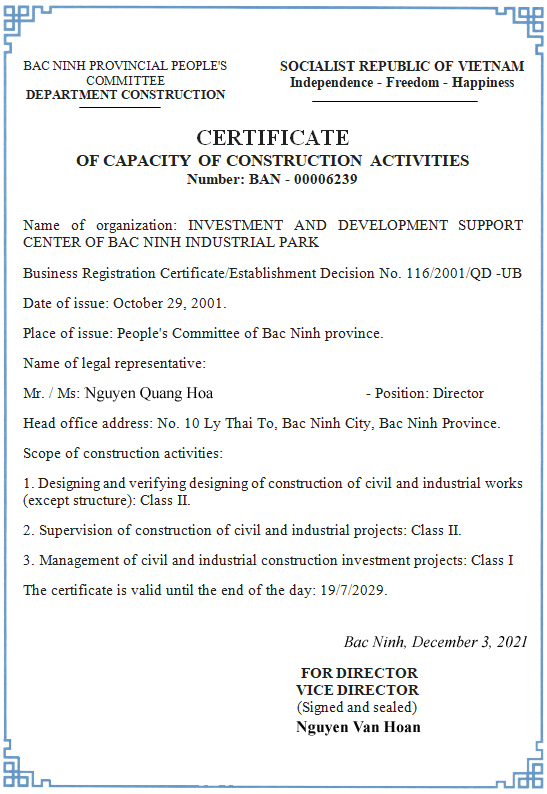1. Certificate
of origin (C/O) new Form D
On
June 1, 2022, the Ministry of Industry and Trade issued the Circular No.
10/2022/TT-BCT amending and supplementing a number of Circulars stipulating the
implementation of the rules of origin in the ASEAN Trade in Goods Agreement.
Specifically: Amending and supplementing a number of articles of the Circular
No. 22/2016/TT-BCT and the Circular No. 19/2020/TT-BCT.
The
Circular No. 10/2022/TT-BCT took effect from July 16, 2022, C/O Form D (new
form) was issued in attachment. C/O Form D as regulated in Appendix II issued
in attachment to the Circular No. 19/2020/TT-BCT (old form) will be issued by
the end of October 31, 2022 and accepted by the customs authority within a
period of time specified in Article 15 of Appendix I issued in attachment to
this Circular.
2.
Adjustment for increasing the regional minimum wage level
From
July 1, 2022, the Decree 38/2022/ND-CP of the Government stipulating the
minimum wage level applicable to employees working under labor contracts took
effect. Accordingly, the minimum monthly wage for employees working for
employers by region is as follows:
Region
I: VND 4,680,000/month (increasing VND 260,000/month); Region II: VND
4,160,000/month (increasing VND 240,000/month); Region III: VND 3,640,000/month
(increasing VND 210,000/month); Region IV: VND 3,250,000/month (increasing VND
180,000/month). At the same time, the new regulation supplements the minimum
hourly wage level by region as follows: Region I: VND 22,500/hour; Region II:
VND 20,000/hour; Region III: VND 17,500/hour; Region IV: VND 15,600/hour. The
list of areas in Region I, Region II, Region III and Region IV is specified in
the Appendix issued in attachment to the Decree 38/2022/ND-CP.
3.
Prohibited acts in the field of invoice, document
On
October 19, 2020, the Government issued the Decree 123/2020/ND-CP regulating
invoices and documents. This Decree took effect from July 1, 2022, in which the
prohibited acts in the field of invoice, document are regulated as follows:
-
For tax civil servants:
+
Cause troubles, difficulties for the organizations, individuals buying
invoices, documents;
+
Have acts of screening, colluding for the organizations, individuals using
illegal invoices, documents;
+
Receive bribes when inspecting, checking invoices.
-
For the organizations, individuals selling, providing goods, services, the
organizations, individuals having the related rights and obligations:
+
Perform fraudulent acts such as using illegal invoices or using invoices
illegally;
+
Obstruct tax civil servants from implementing their public affairs,
specifically acts of obstruction cause injury to health, dignity of the civil
servants during the inspection and check of invoices, documents;
+
Illegally access, falsify or destroy the information system on invoices,
documents;
+
Give bribes or carry out other acts related to invoices, documents for illegal
profits.
4.
Criteria for e-invoice service providers
On
September 17, 2021, the Ministry of Finance issued the Circular No.
78/2021/TT-BTC guiding the implementation of a number of articles of the Law on
Tax Administration dated June 13, 2019, Decree No. 123/2020/ND -CP dated
October 19, 2020 of the Government prescribing invoices and documents. Article
10. Criteria for e-invoice service providers to sign the e-invoice service supply
contract with the tax agency’s code and the service of receiving, transmitting
and storing invoice data and other related services include the following
criteria and regulations:
-
Criteria for organizations providing e-invoice solutions with tax agency’s code
and without code for sellers and buyers.
-
Criteria for organizations providing service of receiving, transmitting and
storing e-invoice data.
-
The General Department of Taxation publishes information of the e-invoice
solution provider and selects the e-invoice service provider to sign the
contract for providing the service of receiving, transmitting and storing
invoice data for the tax agency.
The
Circular 78/2021/TT-BTC took effect from July 1, 2022, encouraging the
agencies, organizations and individuals that meet the conditions on information
technology infrastructure to apply the regulations on electronic invoices and
documents as guided in this Circular and the Decree No. 123/2020/ND-CP before
July 1, 2022.
5.
Regulations on domestic tax accounting period
On
December 14, 2021, the Ministry of Finance issued the Circular 111/2021/TT-BTC
guiding the domestic tax professional accounting. The Circular took effect from
July 1, 2022 prescribing the domestic tax accounting period as follows:
-
The tax accounting period is calculated from the beginning of January 1 to the
end of December 31 of the calendar year.
-
The tax accounting period of the first year for a newly established tax
accounting unit is determined from the beginning of the date the decision on
new establishment, division, separation, consolidation or merger of the tax
accounting unit is valid until the end of December 31 of the calendar year.
-
The final tax accounting period of the tax accounting unit when being divided,
separated, consolidated, merged or dissolved is calculated from the beginning
of January 1 of the calendar year to the end of the day before the date the
decision on division, separation or consolidation, merger and dissolution of
tax accounting units takes effect.
-
The time of the tax accounting period of the first year and the final year
shall comply with the guidance of the Accounting law and the guiding documents.
6. Complete the house rent support for employees in August
2022
On
May 31, 2022, the Ministry of Labor, Invalids and Social Affairs issued the
Document No. 1780/LDTBXH-VL on implementing the Decision 08/2022/QD-TTg
stipulating the house rental support policy for employees. This document
proposed the People’s Committees of the provinces and centrally-run cities to
implement the following contents:
-
Focus on directing the implementation of the Decision 08/2022/QD-TTg
stipulating the implementation of the house rental support policy for employees
to ensure the completion in August 2022.
-
Direct all levels, branches and Management Board of industrial zones, export
processing zones and economic zones to regularly disseminate, monitor and urge
the enterprises to soon implement the procedures to promptly support the house
rent for employees.
-
The Labor federation of the provinces and cities shall direct the grassroots
trade unions to coordinate with the enterprises to check and make list of
employees who request for house rent support.
-
The district-level People’s Committees shall coordinate with the agencies and units
to soon consider, appraise and approve the list of house rent support.
-
Regularly update the data on the online report form about the implementation
result of house rent support.






